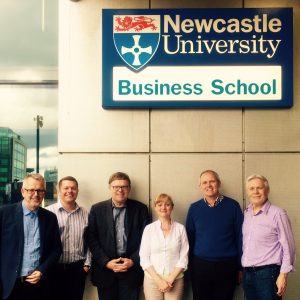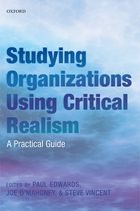There was a lively and successful “roundtable” at Newcastle University Business School on Qualitative Research Methods in June 2016. The discussion leaders included: Greg Bamber, Monash University (right) and all from Newcastle: Mick Brookes, Andrea Whittle, Frank Mueller, Steve Vincent, Steve Procter and (not in the picture) Daniel Muzio. Other participants included a range of early career researchers and PhD students. The event was co-hosted by two NUBS Research Groups: Human Resource Management, Work & Employment, and Strategy, Organisations & Society. The event was organised by Frank Mueller, Greg Bamber and the NUBS Research Team.
Category Archives: Publications
A team from the Human Resource Management, Work and Employment Group participated in the annual British Universities Industrial Relations Association Conference (BUIRA) hosted by the University of Leeds. Members of the group have also taken over the stewardship of BUIRA for the next three years (2016-2019). The new team are Jo McBride (President), Mick Brookes (Membership), Stewart Johnstone (Communications), Ana Lopes (Events) and Stephen Procter (Treasurer). Established in 1950, BUIRA is one of the largest academic associations in the United Kingdom aimed at promoting the study of employment relations across relevant academic disciplines. For more information about the association see http://www.buira.org/
Let’s get real about social research
Paul Edwards, Joe O’Mahoney and Steve Vincent
If you go to the philosophy or social theory section in any decent public or university library you will find voluminous and, we think, rather interesting tomes outlining realist philosophy. In our opinion, these works provide the most plausible approach to understanding the things that go on in the world and how its many parts are interrelated. One of the commitments of this approach is that the forces that cause things happen do not have to be doing anything to have an effect. Take the example of a filmless speed-camera, which routinely slows down the traffic despite the fact it is practically useless for the purposes of enforcing a speed limit. The actual causes of events can be difficult to know and this creates all sorts of problems for researchers. We were left wondering how to develop research methodologies that scratch beneath the surface and seek out those invisible things that actually matter. The philosophy and theory books offer little guide as to how to do it. We thus started to identify social researchers who used critical realism to inform their work and asked them how a commitment to critical realism affected what they did in practice. Our book “Studying Organisations Using Critical Realism” is the outcome of these endeavours.
Our contributors to are suspicious of positivist social scientists, who claim to be “proper” scientists. Positivists tend to explain social phenomena by making generalisations from statistical correlations between observed events. In these accounts all that matters is that which can be measured, which rather fails to scratch beneath the surface – the existence of a speed camera and its correlation with reduced speed offers an explanation in itself. On our opinion, this seems rather thin. Our contributors also feel that social constructivists, who reduce social complexity to the discourses we use to understand it, rather throw the baby out with the bathwater. Whilst the subjective schemas of the driver and their identification the speed camera matter, other things, such as the very real consequences of being caught speeding, tend to fall away from view, despite the fact that these things must be implicated in an explanation. Critical realism encourages the researcher to dig deeper, to reveal the abilities of the driver (their memory, their [in]ability to perceive whether the speed camera has film in it or their imagining of the consequences of their actions). Critical realists look beyond the immediate event, to a world in which traffic enforcement officers have power to sanction behaviour and people know this to be the case. It is only by taking account of this broader range of matters that we can develop a better explanation of why the driver put her foot on the brake as she approached the (redundant) speed camera.
The problem that realists have with positivist and social constructionist approaches is not just that they lack explanatory depth, but that their explanations bear absolutely no relation to the lived experiences of individuals. One hopes that positivists might accept a declaration of love without reaching for the measuring tape and scales, or that constructionists might accept advice about vaccination requirements before they jet off on an exotic holiday. Alternative scenarios in day-to-day life are obviously ludicrous, but for some reason the assumptions seen to carry weight in academia.
In our view, as a consequence of its richer approach to understanding human activities critical realism is the least-worst ontology available and, as such, it should be embraced. We say least worst because, as a result of a commitment to this ontology, we also recognise that our empirical observations are often only flotsam generated by underlying processes which are often invisible; that things can be real at different, related levels; and that many things have properties, powers and potentials that are not presently identifiable. The point is that these commitments all make the process of doing social research quite difficult (indeed, in our view this is why many researchers reach for the relative security of positivist or social constructionist comfort-blankets, or retreat into abstract theory).
However, whilst these commitments make social research difficult we do not see these challenges as insurmountable. Furthermore, the answers that realists develop are, at a basic level, more similar to the ones the “woman on the street” might recognise. If we are to understand, for example, entrepreneurial behaviour, it is useful but not sufficient to show that they are drawing on discourses such as those of “the enterprise culture”. It may also be useful to know that entrepreneurial behaviour is correlated with certain social factors, such as having a parent who was also an entrepreneur. But these explanations are very partial indeed. A realist approach would not only examine the discursive resources that people draw on when they make decisions or their socio-economic characteristics, but also the context within which they reside, the resources they have access to, their attitudes towards their activities and the consequences of their activities for the things that happen around them. In short, critical realist social researchers embrace a rich view of the social agent, who is affected by the things in the surrounding context in knowable ways, whilst they are also engaged in projects that are designed to satisfy their own wants and desires. Who could disagree with this?
The research methodologies outlined in our book unpick, in different ways, aspects of this rich perspective on social agency. We chose to focus primarily on the world of work and organizations, in part because of their centrality to social life and in part to provide a common focus for the individual chapters. These chapters embrace core research methods such as interviews, the case study, discourse analysis, ethnography, action research, comparative methods, and quantitative modelling. Each chapter explains main lines of debate, outlines a realist approach, discusses how it makes a difference, and offers detailed illustration of how the approach works in practice. Realism comes, however, in several varieties. Each chapter explains the specific use made of it, and the challenges faced. We also included some scholars with a broad commitment to realist explanation and others who embrace critical realism – the central difference being that the latter also see their explanations as having reasonably direct implications for social action, whereas other realists prefer a distinction between analysis and prescription. We also included a chapter that reflects on the wider challenges facing realism, critical realism, and later developments known as dialectical realism.
The end result is a compendium that will prove useful for any social researcher who believes there is more to the world than words and numbers, and who then wishes to engage in concrete research. It will also help the many adherents of realism to grasp what the approach can do empirically, but also to see some of the challenges involved.
ESRC Seminar 2 – University of Strathclyde
Under the rubric workplace regulation, employment and State, 58 practitioners in the world of work ranging from academic professors to swarfega’d trade union officials, met to explore the changing dynamics of workplace regulations in the context of declining collective regulation and shifts towards individualistic HRM. The role of trade unionism, in supporting and resisting regulation, quest for mutual gains and the suitability of the proposition to (re)theorise rise employment relations and HM practices to account for the impact of supranational level regulations, as well as a reconfiguration of ‘rules’ at the national level. Heavy biscuits indeed!
But the good news is that this melange of participants opened up deep discussions about real issues about real people in the workplace.
Ringmastered by the urbane Paul Stewart, the morning session looked at performance management, from the vantage point of Prof Phil Taylor of theUniversity of Strathclyde. In terms of his own performance this was a ‘tour de force’ in which he concentrated on the “not so new” workplace tyranny. Phil’s PowerPoint and his handouts were with clear and convincing. So much so on my return to London I circulated them to the appropriate people in my own organisation and to a tranche of researchers in the fields of industrial relations and employee relations. With 15% of the participants from trade unions, we clearly appreciated Phil’s research and his apposite analyses. Simply, it struck a chord with the realities of collective-bargaining in whole swathes of the workforce in modern Britain.
From the anodyne world of human resources to the impact of hundreds of systems creating workplace bullying on an industrial scale. Essentially Phil’s analysis is that this is a seismic moment not simply a time of the business cycle but by redrawing of the new political economic landscape in the recasting of employee relations. This was in concert with the political and legislative onslaught on workers rights and the managerial offensive in the workplace. Concentrating on three integrated elements of the offensive,Phil highlighted performance management, lean working and sickness absence management. Phil concluded that there had been convergence with white collar workers and manual workers and technical workers and professionals. Bluntly, he exposed the meretricious nature of HRM as had been recently practised. Reassuringly Phil’s conclusion was based on the reality of daily events and practices in the workplace that performance management isn’t benign but sinister. A concrete target was the use of the Bell Curve “rank and yank” -which was to be rejected in principle and practice. And his prescriptions were spot on, concrete and achievable. This was a bravura performance by the speaker which was a brilliant springboard into the rest of the day’s activities.
Dr Nathan Lillie of the University of Jyvaskyla in Finland, focussed on “Homo Economicus”
The ideal new European Union Citizen is a mobile worker reacting to the changing contours of the labour market. By constructing an unregulated market this essentially legitimises this market as” normal” this epitomises the evident myth of Homo Economicus as “people have the right NOT to have rights” Nathan was of the view that posted work was a red herring and an invasion of regulation via territorial sovereignty. In his view citizenship in a liberal market confirms rights and belongings and enables market behaviours. Difficulties occur when “home” country practices are introduced for migrant Labour and this results in trade union rights being diminished and social isolation of the workers from abroad. The example of the apartheid regime and the two-tier legal system created an even more segmented labour market. That’s why there was always a call for class solidarity and perhaps that is a reflection of the apartheid in China today with the divisions between rural workers and their city equivalents. Nathan gave an instance of the Finnish construction union where there was an example of solidarity action on behalf of migrant workers
From the University of Manchester, Prof Miguel Martinez Lucio, looked at the management practices, new forms of management,management intervention and Regulation . Miguel labelled this is the stirring of the dark side in organisational behavioural HRM, with the firm in the frame. Trade unions, he argued, need to focus on the firm and the issue of decentralisation in industrial relations. The tripartism of the state had been transferred into the firm and the new forms of collectivism had been determined by the firm. Miguel stated “the new management becomes a new revised actor. Business schools become cathedrals of management.” The state doesn’t disappear but supports business and assists the firm. This is the politics of FDI and inward investment, with the facilitative state creating a new regime of control, marginalising trade unions. Underscoring this was the fact that every government since 1980 when theyhad put employment rights on the statute book; these were invariably individual rights and NEVER collective rights. With New Labour came the sponsorship of business unionism, and partnership with the state colonising spaces or even pulling out of the real dialogue. This period of 1997 to 2010 then witnessed “participation”being pushed out by performance management. Perspicaciously Miguel heralding the view that because of these processes,collective bargaining and oppositional “memories” had been lost. This struck a particular resonance with me in that this was exactly tthe phenomenon which had been belatedly acknowledged in the aftermath of the social contract in the 1970s. And again there was the bitter experience evidenced in the Fire Brigade union strike recently. Bluntly some trade unions (through no fault of their own) had been gullagged into a false sense of security and in going through the Social Contract and partnership model, had lost the art of being able to collectively bargain, neither having retained the skills nor the ideological base to win their justified arguments.
The role of ideology and language oxygenated the move from the cumulative state to the regulatory state,to the ideological state, onto to the coercisive state. The state according to Miguel was now caught in a double movement. With the state in the 1950s and the 1960s being a good example of a good employer,this impacted directly on private employers with decent frameworks in place. Now there is an incapacity of the state -a dysfunctionality. Collectivism is a terrain of struggle.Miguel invited the audience to consider if there was a crisis of management in the firm .The difference between “employers and managers” is increasingly important. This was a theme picked by a good number of participants with companies being owned by faceless people , equity trusts,etc and managed by utterly separate managers. INEOS at Grangemouth would be such an example.
With the state redefining its role as a deliberate strategy does that mean everything is moving towards quantification. It’s interesting in the role of manager that few people now want to be a head teacher. Perhaps, Miguel argued, there was a need to research managerial work in the context of its participative forms. Most practitioners don’t want to talk about regulation yet regulation is omnipresent albeit indirectly. Concluding that the state is being restructured creates “a space” which has to be taken up.In Miguel’s view UNITE the union was attempting to fill this current void.
Moreover Miguel argued that inevitably, with the privatisation of the consultancy state and the reality of boom and bust, the state has to “pick up all the debts”. The costs of stress, neo-liberalism, new management practice,s riots and redundancies -it is always always the state which is left with the tab – and the cost to the public purse is enormous.
The afternoon session was kicked off by Brian Garvey from the University of Strathclyde who argued that all the discussions need to be looked at the context of globalisation and Orwellian scenario of sustainable development. Brian looked at ethanol as a fuel and the agritoxins such as methaneHe asked “what are the systematic externalities of this production.?”
The Plenary Session was a discussion chaired by Stewart Johnstone.There were a number of questions about “soft regulation”,” new government”and the role of New Labour’s proactive( but weak intervention) clearly body swerving collective-bargaining and going for our “educative” partnership approach. If there is a disconnected capitalism, is there disconnected Labour? A series of question and answers surrounded topics such as inequalities, the role of academics, Brussels, EU funding, the potential to exploit the enormous resources which exists within workplaces often through Trade Unionists about initiatives on the learning agenda,for example, on Science Policy where hundreds of thousands of trade union members were qualified practising and informed scientists and should have a view collectively.A fiiting end to a demanding day!
This is my first blog and therefore a wee bit hesitant about my own flavour on things. Nevertheless this was a belting event,with a very wide range of participants who never really got the chance to mingle, chat and network, so intensive was the programme. I was very pleasantly surprised and impressed by the contributors .
I believe that analogy is the mark of a second-rate mind so here’s an analogy. This ESRC seminar series is the space where there is a genuine and needed debate informed by top-class academic research and experienced practitioners in the regulation of work and employment. Newcastle and Strathclyde were both eye-openers for me and I’ve migrated lots of the materials and ideas throughout my union with one and a half million members, 1300 employees and the UK Labour Party biggest affiliate and financial donor. And as an organisation we are not frightened to punch above our weight. So the pebble – which is the seminar series – has already had a significant RIPPLE effect.
On a lighter note, I thought that was merit in people meeting the night before to explain what each was doing and how it may connect with our own activities. The dinner at Newcastle was a first-class opportunity which I appreciated. As a “Glesca Keelie” myself, I was anxious that those who visited the city from the first time had the opportunity to do you a wee bit of exploring the City. Taking them to some of Glasgow’s famous watering holes was easy, getting them out proved impossible. And therefor the delights of Glasgow Cathedral and the Glasgow School of Art with its different CRM were not witnessed.
All in all, a very valuable and satisfactory experience for myself and colleagues whom I had dragooned to Strathclyde. Of course I accepted all the plaudits from them as they too really appreciated the lectures, debates and discussions.
‘Have British Workers Lost Their Voice?’
“My research is broadly concerned with the management of work and people, and past research has examined a range of HR and employment relations issues. However, one of my core interests is the notion of employee voice. Put simply, employee voice is concerned with workers having a say and input into organisational decision-making. For employers, interest in employee voice might be driven by a belief that it makes good business sense to capture the ideas and knowledge which resides within the heads of everyone working within their organisation. For employees, having an opportunity to express opinions and ideas can potentially make work more interesting and satisfying, as well as providing a chance to improve the overall experience of work. A central assumption is that both employers and employees stand to benefit from giving workers a voice.”
“Traditionally, employee voice was synonymous with trade unions negotiating terms and conditions of employment, and perhaps given this focus, the default relationships between unions and management were assumed to be hostile. However, over the last ten years, I have conducted extensive research exploring the concept of ‘partnership’ between employers and trade unions, where employers and unions commit to work together and engage in dialogue regarding a wide range of issues for the overall benefit of the business. Much of this has involved case studies of employment relations in the UK financial service sector. The central idea of partnership is that both sides work together to increase the size of the overall pie as well as fighting over the size of their slices. However, many organisations, especially in the private sector, no longer recognise trade unions and as such some of my research has also explored other options for collective employee representation such as in-house ‘staff councils’ and ‘employee forums’. While in many European nations consultation with employees over workplace and business issues is a normal part of workplace life, the UK has often seemed to lag behind in this regard leading to concerns that British workers have lost their voice. I have written a range of articles on these themes, I am currently editing a book ‘Finding a Voice: Employee Representation in the New Workplace’ which will be published by Oxford University Press next year (2014).”
“Current research, funded by the British Academy/Leverhulme Trust, continues this line of enquiry by exploring the dynamics of workplace relations in tough economic times, with a particular focus on issues of employee voice and employee engagement in light of the global financial crisis. I’m particularly interested in finding out more about how periods of crisis affect workforce relations: can crisis actually bring an organisation closer together, or does it inevitably have a negative impact on employee engagement and voice?”
Stewart is Lecturer in HRM at Newcastle University Business School. Prior to this he was on the faculty in the School of Business and Economics at Loughborough University. His research and teaching interests traverse human resource management and employment relations. Recent projects have examined various issues concerned with the management of work and people.



